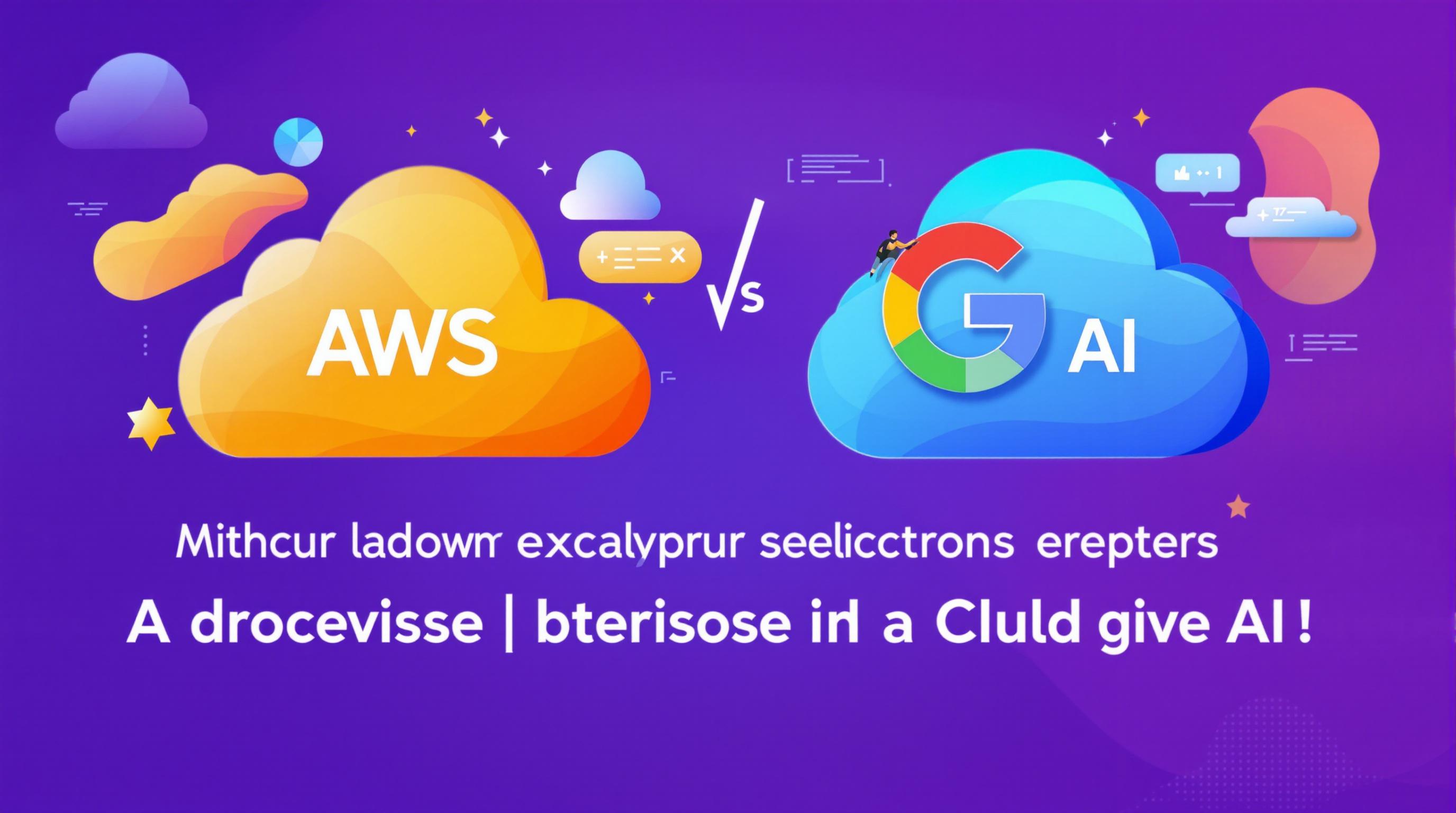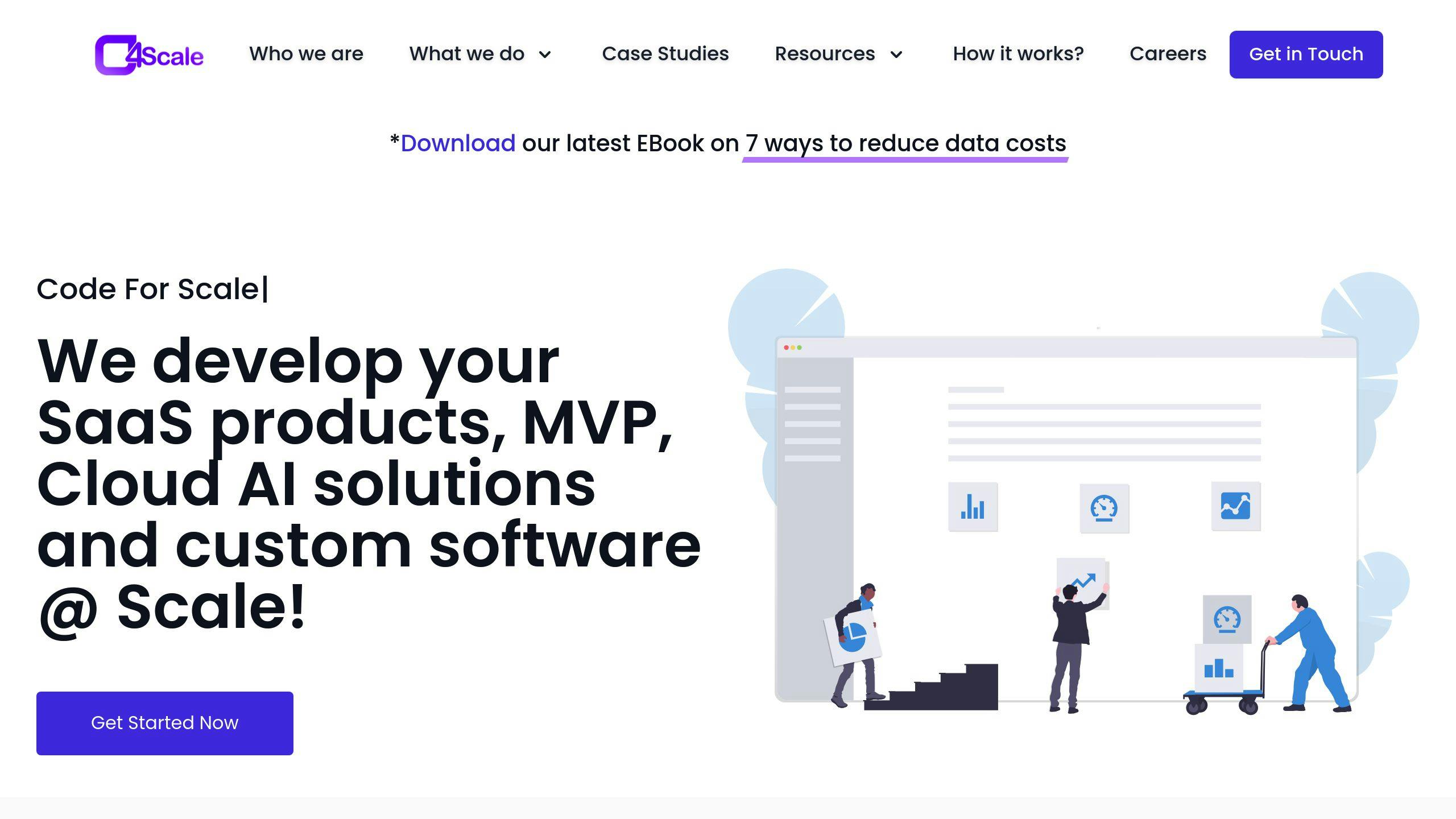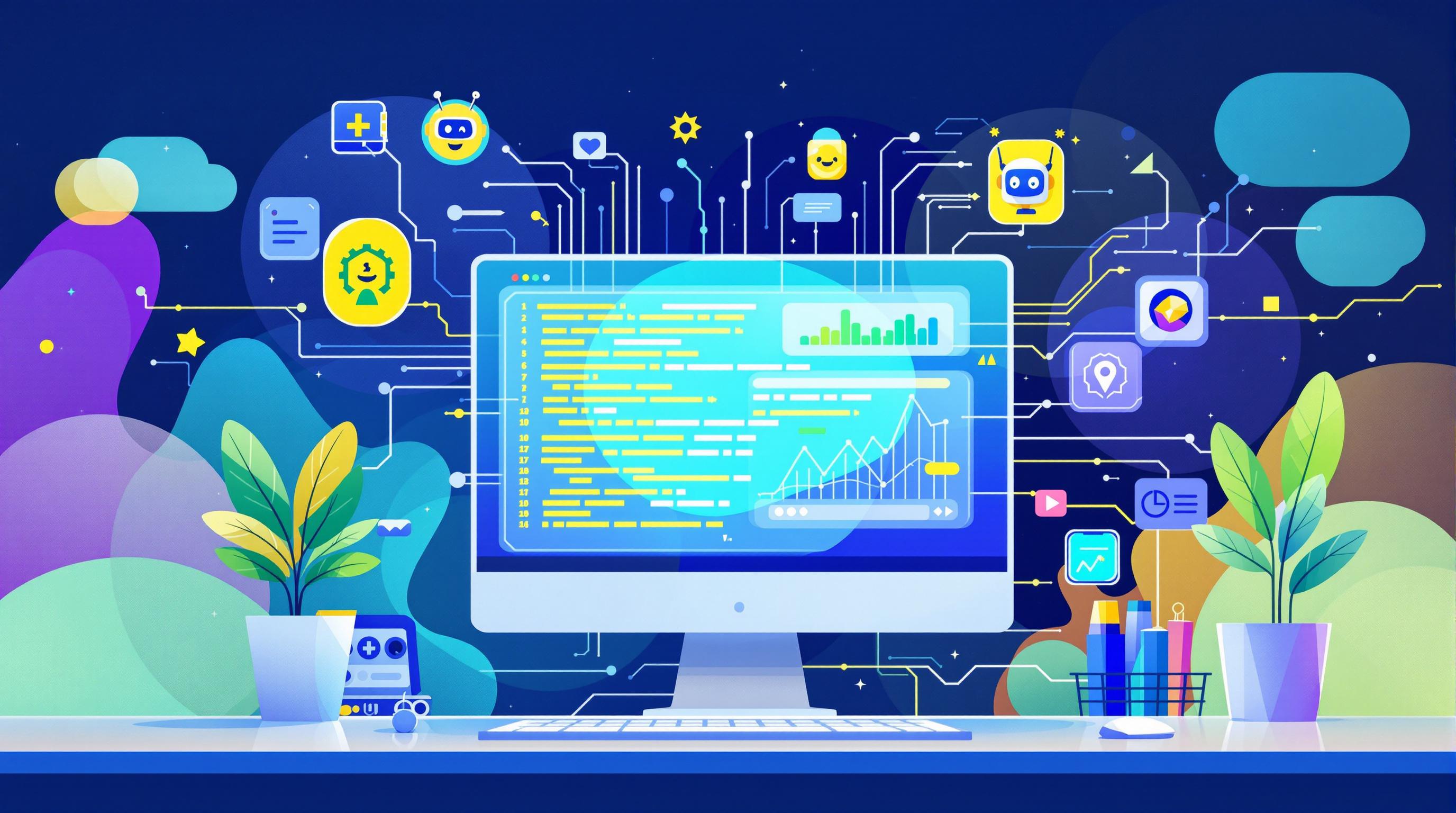
Back to Blogs
Comparing AWS AI and Google Cloud AI: A Technical Engineer’s Guide to Selecting the Right Enterprise AI Platform
Technology
Comparing AWS AI and Google Cloud AI: A Technical Engineer’s Guide to Selecting the Right Enterprise AI Platform
Choosing between AWS AI and Google Cloud AI can be challenging, but it boils down to your technical needs, budget, and goals. Here's a quick breakdown:
- AWS AI: Best for enterprises already using AWS, offering customizable tools like SageMaker for machine learning and deep integration with AWS services.
- Google Cloud AI: Focused on automation and ease of use, ideal for teams seeking fast deployment with tools like Vertex AI and AutoML.
Quick Comparison Table
| Feature | AWS AI | Google Cloud AI |
|---|---|---|
| Strengths | Customization, deep AWS integration | Automation, AI-first solutions |
| Key Tools | SageMaker, Rekognition, Glue | Vertex AI, AutoML, BigQuery ML |
| Cost | Higher for custom setups | Lower for large-scale AI projects |
| Best For | Enterprises in AWS ecosystem | Teams new to AI or multi-cloud users |
Both platforms are powerful but serve different purposes. AWS excels in control and scalability for complex systems, while Google Cloud simplifies AI adoption for quicker results. Continue reading for a deeper dive into their tools, use cases, and technical details.
Cloud Provider Comparisons: AWS vs Azure vs GCP - Artificial Intelligence and Machine Learning

Overview of AWS AI and Google Cloud AI
AWS AI: Key Tools and Features
AWS AI provides tools tailored for businesses, such as SageMaker, which supports scalable machine learning (ML) solutions. Its services integrate smoothly with existing AWS infrastructure, offering powerful options for deploying AI projects.
| Service Category | Tools | Primary Enterprise Use |
|---|---|---|
| Machine Learning | SageMaker | Model development and deployment |
| Computer Vision | Rekognition | Image/video analysis, content moderation |
| Natural Language | Comprehend | Text analysis, sentiment detection |
| Conversational AI | Amazon Lex | Chatbots, voice assistants |
| Data Processing | AWS Glue | Data preparation and ETL |
AWS AI focuses on offering a wide range of tools that can be customized to meet specific enterprise needs. In contrast, Google Cloud AI leans heavily on automation to simplify AI adoption for businesses.
Google Cloud AI: Key Tools and Features
Google Cloud AI is built around automation, with tools like Vertex AI for managing ML operations and AutoML for creating custom models. These tools are designed to enable businesses to deploy AI solutions quickly, even without extensive ML expertise.
| Service Category | Tools | Primary Enterprise Use |
|---|---|---|
| Machine Learning | Vertex AI | Full lifecycle ML management |
| AutoML | Cloud AutoML | Custom model development |
| Conversational AI | Dialogflow | Natural language interfaces |
| Data Analytics | BigQuery ML | Large-scale data processing |
| MLOps | Vertex AI Workbench | Model lifecycle management |
Both platforms have their strengths, and selecting the right one depends on the specific needs and expertise of the enterprise.
Comparing Use Cases for AWS AI and Google Cloud AI
AWS AI and Google Cloud AI take different approaches to enterprise AI, each with unique strengths:
| Use Case | AWS AI Approach | Google Cloud AI Approach |
|---|---|---|
| Data Engineering | Integrates deeply with AWS services | Emphasizes automated data processing |
| Model Development | Offers extensive customization options | Focuses on automation and simplicity |
| Enterprise Integration | Strong integration within AWS ecosystem | Compatible with a range of third-party tools |
AWS AI stands out for its customizable tools and deep integration with AWS infrastructure, making it a strong choice for businesses seeking tailored solutions. On the other hand, Google Cloud AI's automation-first approach is ideal for companies aiming for fast and straightforward AI deployments. By evaluating these differences, businesses can match platform capabilities to their specific goals.
Scalability and Integration: A Detailed Comparison
Handling Large AI Workloads
AWS SageMaker provides flexibility with both manual scaling and auto-scaling options, making it suitable for organizations that need precise control. On the other hand, Google Cloud AI leans heavily on automation, dynamically managing resources to support multiple workloads across departments.
Key Performance Factors:
| Workload Type | AWS AI Capability | Google Cloud AI Capability |
|---|---|---|
| Model Training | Manual and auto-scaling options | Automated scaling for multiple models |
| Real-time Processing | Kinesis for streaming analytics | Cloud Pub/Sub for real-time data |
| Batch Processing | AWS Glue for ETL operations | Cloud Dataflow for batch processing |
| Resource Management | Customizable resource allocation | Automated optimization |
Scalability is crucial for managing larger workloads, but integration plays an equally important role in ensuring these tools fit seamlessly into existing enterprise systems.
Integration with Enterprise Systems
AWS AI and Google Cloud AI offer different strengths when it comes to enterprise integration. AWS stands out for its native ecosystem compatibility, while Google Cloud prioritizes ease of connection with third-party tools. AWS AppFlow and Google Cloud Data Fusion both provide pre-built connectors, but AWS is tailored for its ecosystem, whereas Google Cloud supports a wider range of external services.
Enterprise Integration Features:
| Integration Aspect | AWS AI | Google Cloud AI |
|---|---|---|
| Data Lake Connection | Native S3 integration | Cloud Storage integration |
| ERP Systems | Native AWS ecosystem connectors | Broad third-party compatibility |
| Security Controls | IAM with encryption | Cloud IAM with encryption |
| Compliance Standards | GDPR, HIPAA compliant | GDPR, HIPAA compliant |
Side-by-Side Comparison: Scalability and Integration
| Feature | AWS AI | Google Cloud AI |
|---|---|---|
| Deployment Options | EC2 instances, Lambda functions | Batch, online, custom prediction |
| Data Processing | Built-in transformation tools | AutoML and TensorFlow integration |
| Infrastructure Management | Manual configuration and auto-scaling | Fully automated optimization |
| Third-party Integration | AWS marketplace ecosystem | TensorFlow ecosystem |
Both platforms are well-suited for enterprise AI needs, but they approach scalability and integration differently. AWS AI emphasizes control and configurability, while Google Cloud AI focuses on automation and ease of use. These differences allow engineers to choose the platform that best aligns with their organization's AI goals and infrastructure [4].
Cost and ROI: Evaluating the Investment
Understanding Pricing for AWS AI and Google Cloud AI
Both AWS AI and Google Cloud AI use a pay-as-you-go pricing model, with options tailored for enterprise needs. For large-scale deployments, Google Cloud AI often comes in about 20% cheaper than AWS AI, especially for training and storage services [4]. Knowing these pricing details can help engineers align their choice with budget limits and project objectives.
Here’s how pricing differs for specific services:
| Service Type | AWS AI | Google Cloud AI |
|---|---|---|
| Data Processing | Charged per GB processed | Charged per unit of processing time |
| Long-term Commitment | Discounts vary | Up to 52% discount on 3-year plans [4] |
How to Measure ROI for AI Projects
To determine ROI, engineers should look at two main areas: operational efficiency (like reducing manual work or optimizing resources) and business outcomes (such as faster time-to-market or better customer experiences). For instance, 66degrees reported improved performance and cost reductions after switching to Google Cloud AI [4].
Side-by-Side Comparison: Cost and ROI
| Factor | AWS AI | Google Cloud AI |
|---|---|---|
| Initial Setup Costs | Higher upfront investment for custom setups | Lower entry costs with AutoML solutions |
| Operational Expenses | Pay-per-use model optimized for AWS users | Flexible pricing, supports multi-cloud setups |
| Scaling Costs | Linear scaling based on usage | More budget-friendly for large-scale projects |
| Integration Expenses | Lower for AWS ecosystem users | Lower for multi-cloud and diverse environments |
| Long-term Value | Best for AWS-centric environments | Better for multi-cloud setups and diverse tools |
The decision often depends on your current infrastructure and long-term AI goals. Google Cloud AI shines in machine learning and AI-focused projects, making it a cost-efficient choice for businesses prioritizing these areas [6][1]. On the other hand, AWS AI may be a better fit for organizations already deeply integrated into the AWS ecosystem.
While cost and ROI matter, the ultimate decision should also factor in technical needs and how the platform fits into your specific use case.
Technical Details and Case Studies
Technical Requirements for Development
When it comes to development, AWS AI leans heavily on Python and SageMaker, while Google Cloud AI focuses on TensorFlow and AutoML for a smoother process.
| Requirement | AWS AI | Google Cloud AI |
|---|---|---|
| Development Platform | SageMaker | AutoML, ML Engine |
| Languages | Python, Java | Python, TensorFlow |
| Infrastructure | AWS Services (S3, DynamoDB) | Google Cloud Services |
| Deployment | EC2 instances, Lambda functions | Batch/Online prediction |
| Data Processing | Amazon Redshift, Kinesis | BigQuery, Cloud Pub/Sub |
AWS AI is well-suited for large-scale deployments, offering tools that support complex workflows. On the other hand, Google Cloud AI simplifies development with its AutoML features and seamless integration with TensorFlow [3]. These differences play a major role in how enterprises use these platforms, as shown in real-world examples from companies like Netflix and Domino's Pizza.
Examples of Enterprise Use
Netflix relies on Amazon SageMaker and Kinesis to handle millions of daily user interactions. This setup enables real-time, AI-driven recommendations, achieving an impressive 80% engagement rate with personalized suggestions [1]. The platform's ability to manage high volumes of data in real time underscores AWS AI's capability for large-scale data processing.
"Google Cloud AI Platform's integration with TensorFlow and AutoML capabilities has been particularly valuable for enterprises without extensive data science expertise", according to a recent technical evaluation [3].
Domino's Pizza, on the other hand, uses Google Cloud AI to power its customer service chatbot. This system handles tasks like order tracking, menu recommendations, and customer support. By integrating with Cloud Pub/Sub and BigQuery, Domino's ensures real-time data processing and smooth operations [5]. This example highlights Google Cloud AI's adaptability and scalability for customer-focused applications.
Case studies show that AWS AI tends to dominate in legacy cloud setups, while Google Cloud AI shines when onboarding new AI users. Both platforms meet enterprise needs effectively, with their strengths depending on specific technical goals and use cases.
Conclusion: Making the Right Choice
AWS AI vs. Google Cloud AI: Key Takeaways
When comparing enterprise AI platforms, both AWS AI and Google Cloud AI bring distinct strengths to the table. AWS holds a 34% share of new cloud AI case studies, while Google Cloud is gaining ground, with 36% of its new public cloud case studies featuring AI products [1]. This growth highlights Google's focus on AI, exceeding its overall cloud market share by 8 percentage points [1].
| Platform | Strengths | Best Suited For |
|---|---|---|
| AWS AI | SageMaker tools, legacy system compatibility | Enterprises with established AWS infrastructure |
| Google Cloud AI | AutoML tools, budget-friendly pricing | Teams seeking ease of use and cost efficiency |
These platforms cater to different needs, so understanding their strengths is key to making an informed choice.
How to Choose the Best Platform for Your Business
Choosing the right platform comes down to your organization's goals, technical expertise, and existing systems. AWS is ideal for scaling legacy systems, while Google Cloud simplifies AI adoption for newer users.
- AWS AI: Known for its strong integration tools, AWS supports complex enterprise environments through its SageMaker ecosystem.
- Google Cloud AI: Offers user-friendly deployment options, making it a great choice for teams needing quick implementation.
Final Recommendations
Here’s how to narrow down your decision:
- Assess your team's AI experience: If your team is new to AI, Google Cloud's AutoML and ML Engine provide accessible starting points [2].
- Review integration needs: For enterprises with complex systems, AWS's integration capabilities through SageMaker are unmatched.
- Factor in deployment speed and resources: If speed is a priority, Google Cloud's simpler deployment process may fit better, while AWS offers more customization for those with time and resources.
Running pilot projects on both platforms can help you determine which aligns better with your technical needs and long-term AI plans. Both AWS and Google Cloud continue to evolve, so staying updated on their offerings is crucial.
The best platform for your business will depend on how its features match your specific AI goals and strategy.
Additional Information and Tools
Comparison Table: AWS AI vs. Google Cloud AI
Here's a quick breakdown of the core differences between AWS AI and Google Cloud AI to help you understand their strengths:
| Feature | AWS AI | Google Cloud AI |
|---|---|---|
| Computational Power | High raw processing capacity | Optimized for specific AI tasks |
| AI Ecosystem | Deeply tied to AWS cloud services | Strong focus on TensorFlow tools |
| Development Tools | SageMaker-focused environment | AutoML and Vertex AI workflows |
| Enterprise Integration | Amazon Bedrock, extensive APIs | Built-in support for Google Workspace |
| Architecture | Emphasis on distributed computing | Container-based orchestration |
| Special Features | Traditional ML and deep learning | Advanced GenAI and AutoML options |
Helpful Resources and Guides
Once you've chosen the platform that fits your needs, these resources can simplify implementation:
- AWS AI: Access guides, tutorials, and documentation for tools like SageMaker and Bedrock. These focus on enterprise integration and practical use cases.
- Google Cloud AI: Dive into resources for Vertex AI, TensorFlow, and AutoML, tailored for real-world deployment scenarios.
Many learning platforms also offer hands-on training for both AWS AI and Google Cloud AI, helping engineers gain experience with large-scale implementations [6].
C4Scale: Partner for Custom AI Solutions

C4Scale specializes in helping businesses implement AI solutions using AWS AI or Google Cloud AI. Their services include:
- Building and validating proof-of-concepts
- Integrating AI systems with enterprise environments
- Overseeing technical architecture
- Providing scalable support for deployment
For companies exploring these platforms, C4Scale offers expert guidance to ensure the deployment meets both technical and business goals.
FAQs
Will GCP overtake AWS?
Based on current trends, it's unlikely that GCP will surpass AWS anytime soon. Here's the breakdown:
Market Share and Infrastructure
AWS currently dominates with 93 zones across 29 regions, while GCP operates 106 zones in over 200 countries. GCP is gaining traction, especially in AI, with 36% of its new public cloud case studies highlighting AI-related projects [1].
GCP stands out in AI services and customization, offering tools like Vertex AI and AutoML [3].
Key Differences:
| Aspect | AWS | GCP |
|---|---|---|
| Market Position | Leading with a strong enterprise base | Rapid growth in AI adoption |
| AI Capabilities | Broad service range in traditional AI | Focused on AutoML and TensorFlow |
| Development Approach | Comprehensive enterprise solutions | Prioritizes AI-specific innovation |
Although GCP is making strides in AI, especially with tools like Vertex AI and AutoML [3], AWS's extensive infrastructure and established presence keep it in the lead. GCP's focus on AI makes it a compelling choice for enterprises prioritizing AI-driven solutions [1].
Ultimately, the right platform depends on the specific needs of your business, as discussed throughout this guide.
Related Blogs

Technology
15 Jan 2025
Deploying Conversation AI Solutions at Scale: NLP Stacks, Microservices, and Secure Data Pipelines
Learn how to scale conversational AI with NLP tools, microservices, and secure data pipelines, enhancing performance and security.

Technology
15 Jan 2025
AI-Driven Code Smell Detection: How It Works
Explore how AI-driven tools enhance code smell detection, improving code quality and reducing technical debt in software development.
